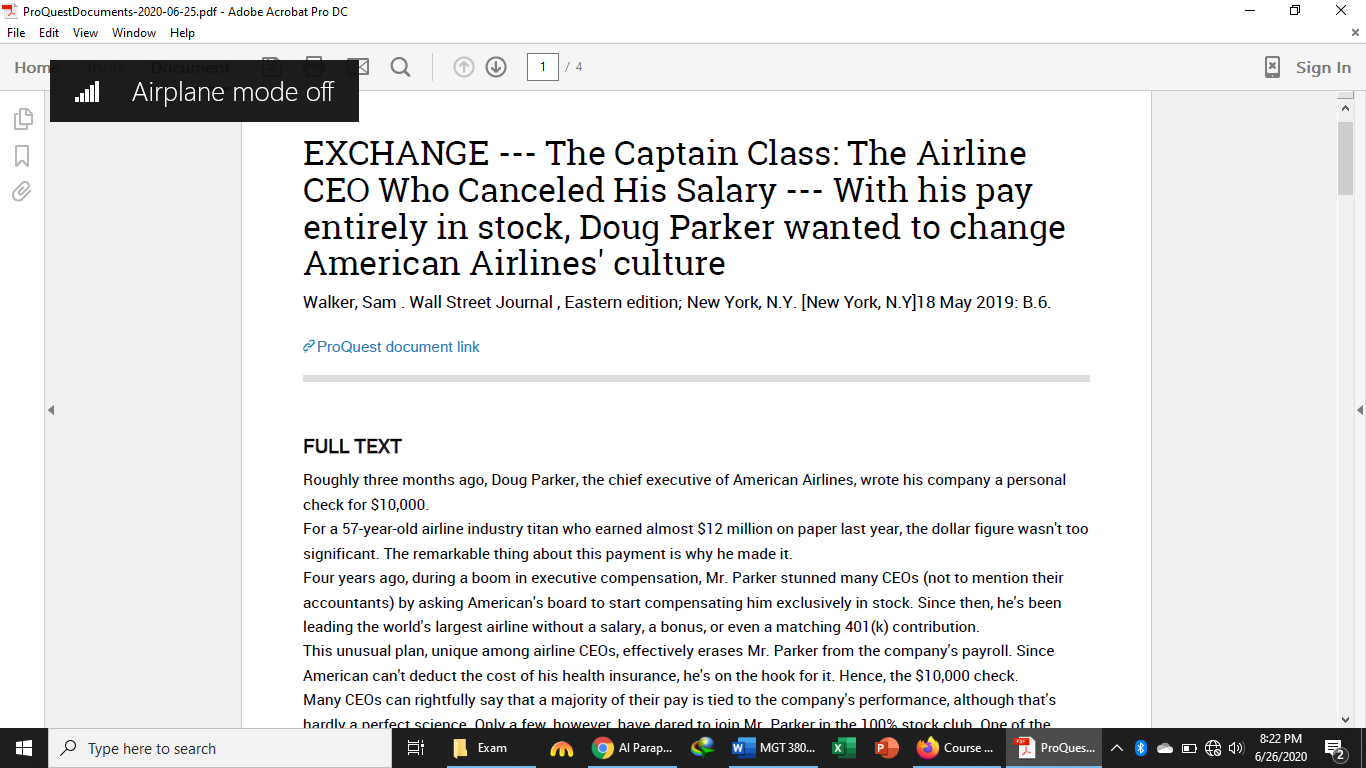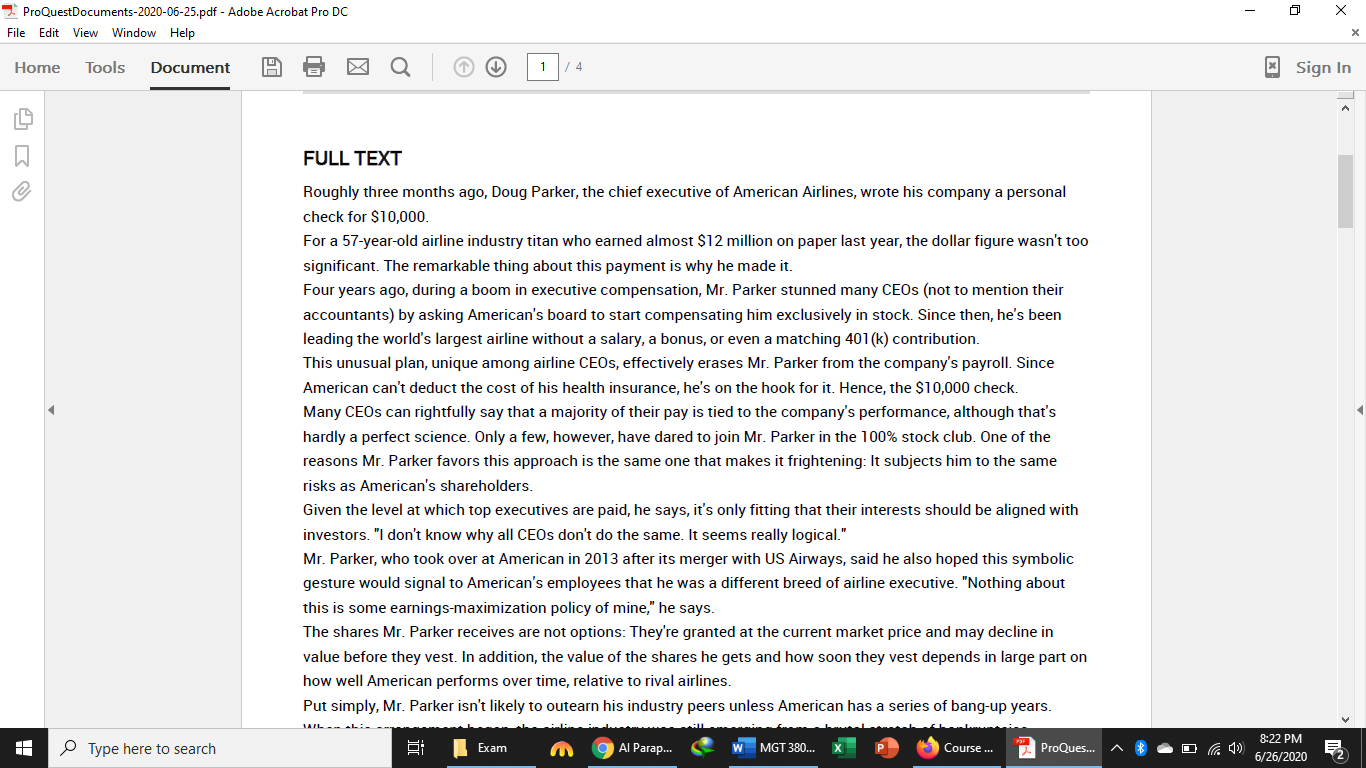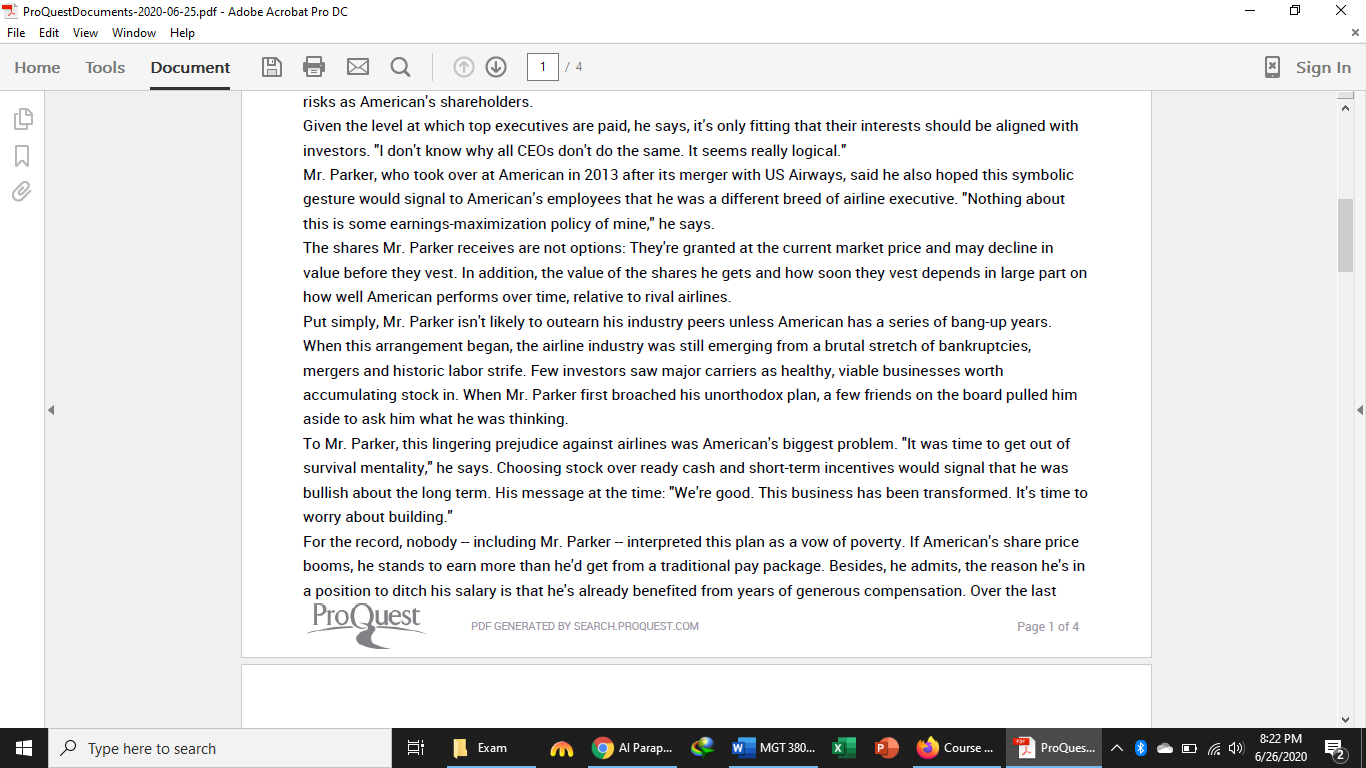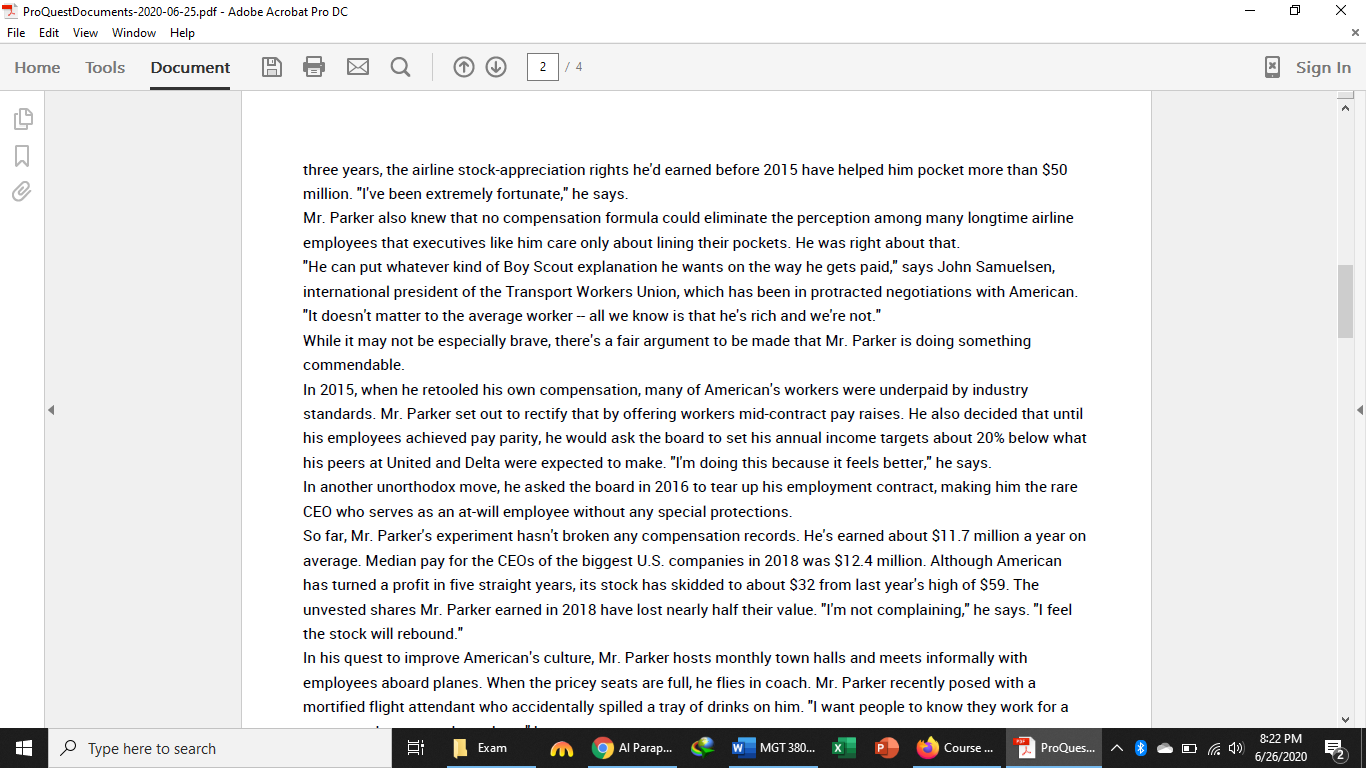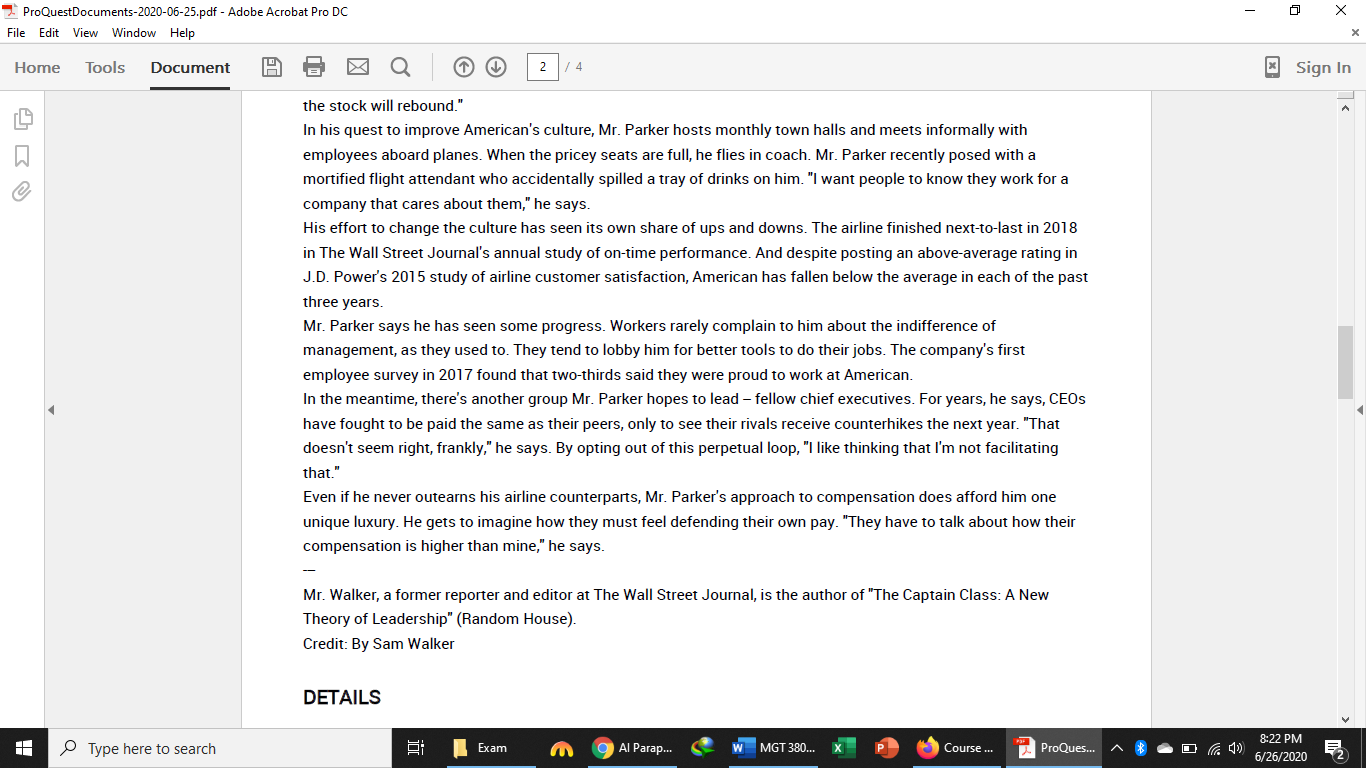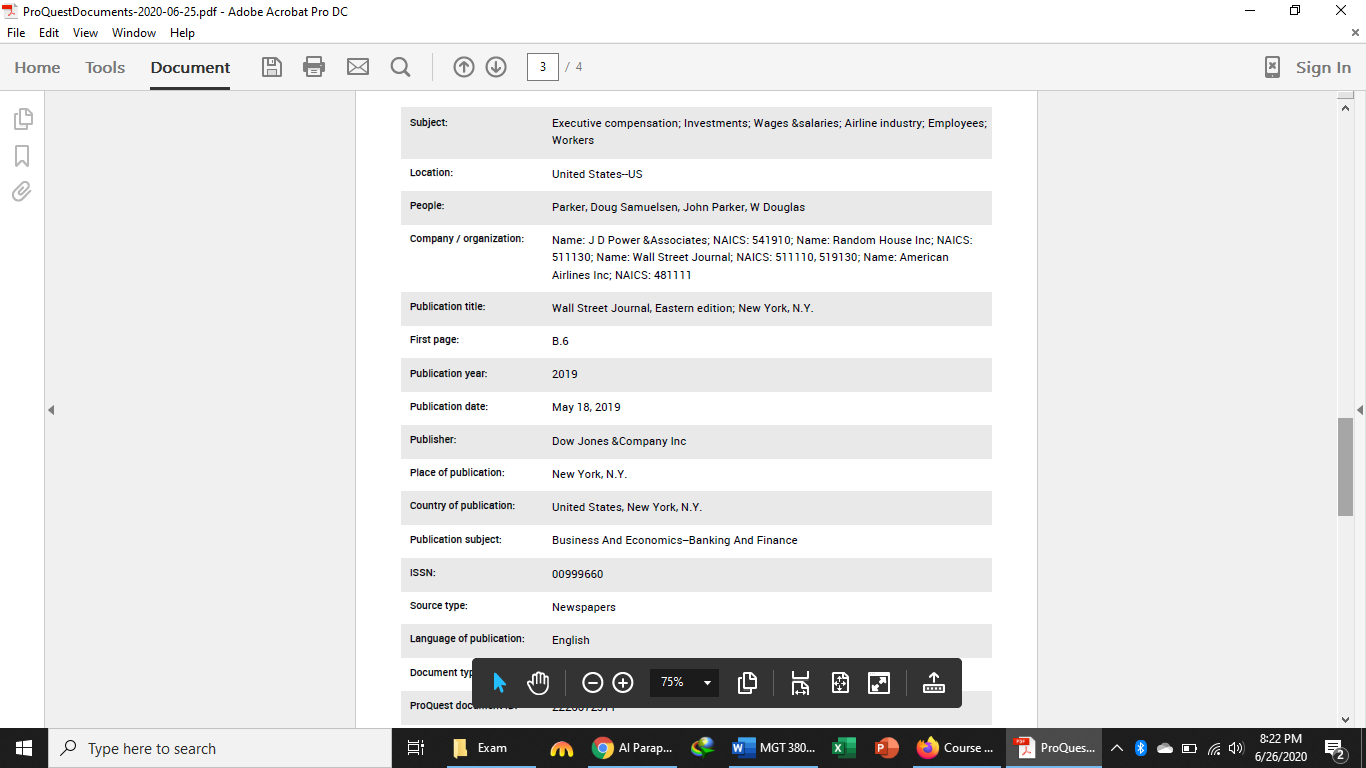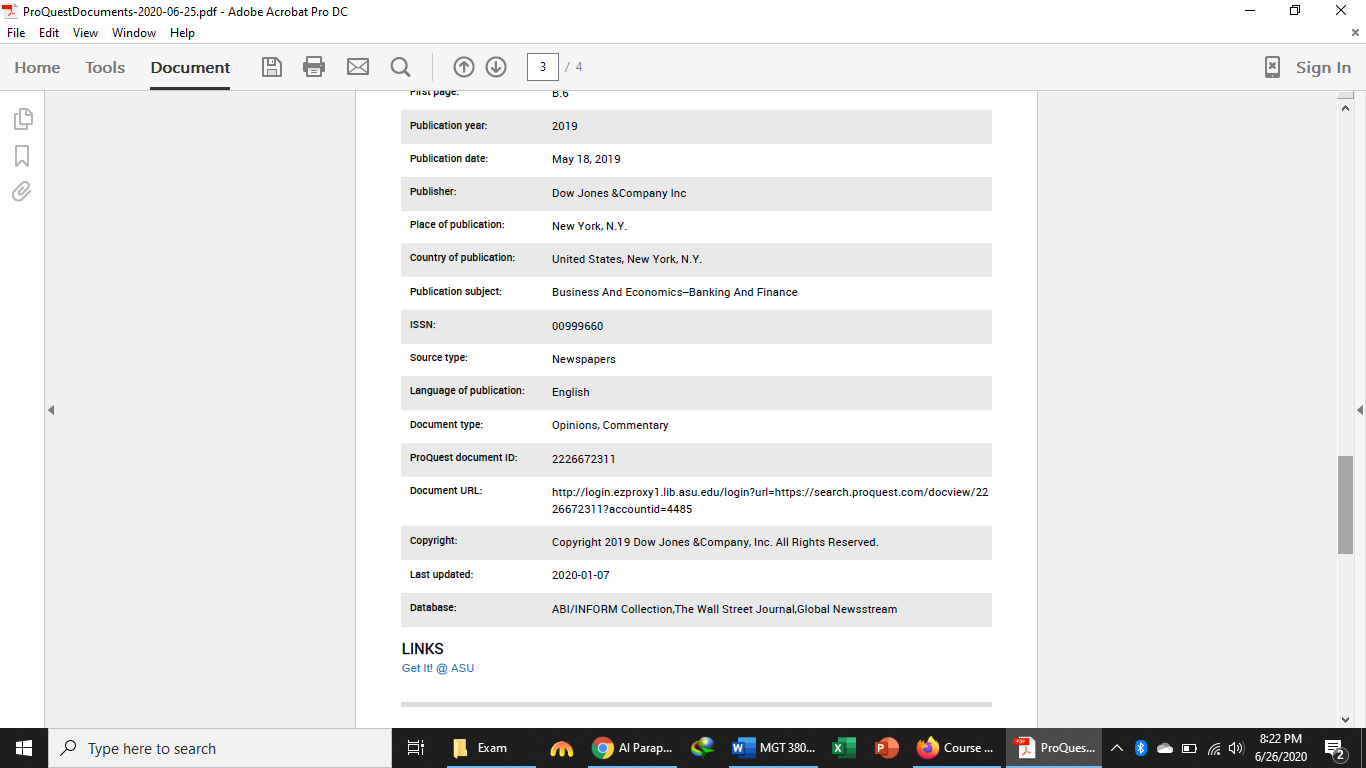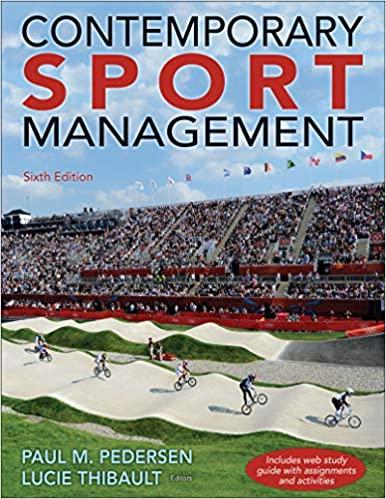According to Doug Parker's role as CEO of American Airlines and Leadership. How did Doug Parker's actions, as described in the article (first cutting his pay to 20% below the industry average, and then eliminating his salary altogether and relying solely on stock for compensation, flying coach...) have an impact on his Five Sources of Power?
ProQuestDocuments-2020-06-25.pdf - Adobe Acrobat Pro DC X File Edit View Window Help X Hom Q 1 1 4 Sign In Airplane mode off EXCHANGE --- The Captain Class: The Airline CEO Who Canceled His Salary --- With his pay entirely in stock, Doug Parker wanted to change American Airlines' culture Walker, Sam . Wall Street Journal , Eastern edition; New York, N.Y. [New York, N. Y]18 May 2019: B.6. ProQuest document link FULL TEXT Roughly three months ago, Doug Parker, the chief executive of American Airlines, wrote his company a personal check for $10,000. For a 57-year-old airline industry titan who earned almost $12 million on paper last year, the dollar figure wasn't too significant. The remarkable thing about this payment is why he made it. Four years ago, during a boom in executive compensation, Mr. Parker stunned many CEOs (not to mention their accountants) by asking American's board to start compensating him exclusively in stock. Since then, he's been leading the world's largest airline without a salary, a bonus, or even a matching 401 (k) contribution. This unusual plan, unique among airline CEOs, effectively erases Mr. Parker from the company's payroll. Since American can't deduct the cost of his health insurance, he's on the hook for it. Hence, the $10,000 check. Many CEOs can rightfully say that a majority of their pay is tied to the company's performance, although that's hardly a perfect science Only a few however have dared to join Mr Parker in the 100% stock club One of the Type here to search gi Exam m ) Al Parap.. W MGT 380. P Course . ProQues. () 8:22 PM 6/26/2020'1: ProQuestDocurnents-ZOZO-05-25pdf - Adobe Acrobat Pro DC X FllE Edlt VIEW Window Help X Home Tools Document [E] a E Q G) 1 f4 E Signln @ 1:] FULL TEXT @ Houghly three months ago. Doug Parker. the chief executive ofAmencan Airlines. wrote his company a personal check fof $10,000. For a 57-year-old airline industry titan who eamed almost $12 million on paper last year. the dollar figure wasn't too signicant. The remarkable thing about this payment is why he made it. Four years ago. during a boom in executive compensation. Mr. Parker stunned many CEOs (not to mention their accountants) by asking American's board to start compensating him exclusively in stock. Since then. he's been leading the world's largest airline without a salary. a bonus. or even a matching 40] (k) contribution. This unusual plan. unique among airline CEOs, effectively erases Mr. Parker from the company's payroll. Since American can't deduct the cost of his health insurance. he's on the hook for it. Hence, the $10.00!] check. 4 Many CEOs can rightfully say that a majority of their pay is tied to the company's performance. although that's 4 hardly a perfect science. Only a few. however, have dared to join Mr. Parker in the 100% stock club. One of the reasons Mr. Parker favors this approach is the same one that makes it frightening: It subjects him to the same risks as Amencan's shareholders. Given the level at which top executives are paid. he says. it's only fitting that their interests should be aligned with investors. 'I don't know why all CEOs don't do the same. It seems really logical.\" Mr. Parker, who took over at American in 2013 after its merger with US Airways, said he also hoped this symbolic gesture would signal to American's employees that he was a different breed of airline executive. 'Nothing about this is some eamingsmaximization policy of mine.' he says. The shares Mr. Parker receives are not options: Theer granted at the current market price and may decline in value before they vest. In addition. the value of the shares he gets and how soon they vest depends in large part on how well American performs over time. relative to rival airlines. Put simply, Mr. Parker isn't likely to outeam his industry peers unless American has a series of bangup years. ,9 Type here to search '1: ProQuestDocurnenti-ZOZO-OS-Eipdf - Adobe Acrobat Pro DC FllE Edit View Window Help Home Tools Document @ III @ [E] SEQ @1r4 risks as Americans shareholders. Given the level at which top executives are paid. he says. it's only fitting that their interests should be aligned with investors. 'I don't know why all CEOs don't do the same. It seems really logical.\" Mr. Parker, who took over at American in 2013 after its merger with US Airways, said he also hoped this symbolic gesture would signal to American's employees that he was a different breed of airline executive. \"Nothing about this is some eamingsmaximization policy of mine.' he says. The shares Mr. Parker receives are not options: Thefre granted at the current market price and may decline in value before they vest. In addition. the value of the shares he gets and how soon they vest depends in large part on how well American performs over time. relative to rival airlines. Put simply, Mr. Parker isn't likely to outeam his industry peers unless American has a series of bangup years. When this arrangement began. the airline industry was still emerging from a brutal stretch of bankruptcies, mergers and historic labor strife. Few investors saw major caniers as healthy. viable businesses worth accumulating stock in. When Mr. Parker first broached his unorthodox plan, a few friends on the board pulled him aside to ask him what he was thinking. To Mr. Parker. this lingering prejudice against airlines was American's biggest problem. 'It was time to get out of survival mentality,' he says. Choosing stock over ready cash and short-term incentives would signal that he was bullish about the long term. His message at the time: "We're good. This business has been transformed. It's time to worry about building.' For the record, nobody including Mr. Parker interpreted this plan as a vow of poverty. If American's share price booms. he stands to earn more than he'd get from a traditional pay package. Besides. he admits, the reason he's in a position to ditch his salary is that he's already beneted from years of generous compensation. Over the last ,EIQ%-e_sk[' PDF GENERATED EV SEARCHPROQUESTLOM Page l of 4 '1: ProQuestDocurnerits-ZOZO-OS-ESpdf - Adobe Acrobat Pro DC X File Edit View Window Help X Home Tools Document [E] a E Q @@ E f4 E Signln @ A El three years, the airline stockappreciation rights he'd earned before 2015 have helped him pocket more than 850 @ million. 'l've been extremely fortunate.' he says. Mr. Parker also knew that no compensation formula could eliminate the perception among many longtime airline employees that exectnives like him care only about lining their pockets. He was right about that. 'He can put whatever kind of Boy Scout explanation he wants on the way he gets paid,' says John Samuelsen, international president of the Transport Workers Union, which has been in protracted negotiations with American. \"It doesn't matter to the average worker 7 all we know is that he's rich and we're not." While it may not be especially brave, there's a fair argument to be made that Mr. Parker is doing something commendable. In 201 5, when he retooled his own compensation, many ofAmerican's workers were underpaid by industry standards. Mr. Parker set out to rectify that by offering workers midcontract pay raises. He also decided that until ' his employees achieved pay parity, he would ask the board to set his annual income targets about 20% below what his peers at United and Delta were expected to make. 'l'm doing this because it feels better,' he says. In another unorthodox move, he asked the board in 2016 to tear up his employment contract, making him the rare CEO who serves as an atiwill employee without any special protections. So far, Mr. Parker's experiment hasn't broken any compensation records. He's earned about 31 1.7 million a year on average. Median pay for the CEOs of the biggest US. companies in 2018 was $12.4 million. Although American has turned a prot in ve straight years. its stock has skidded to about $32 from last year's high of 359. The unvested shares Mr. Parker eamed in 201 B have lost nearly half their value. 'l'm not complaining.' he says. 'I feel the stock will rebound.' In his quest to improve American's culture. Mr. Parker hosts monthly town halls and meets informally with employees aboard planes. When the pricey seats are full, he flies in coach. Mr. Parker recently posed with a monified ight attendant who accidentally spilled a tray of drinks on him. "I want people to know they work for a ,9 Type here to search '1: ProQuestDocurnenti-ZOZO-OS-ESpdf - Adobe Acrobat Pro DC X FIlE Edit VIEW Window Help x Home Tools Document [E] a E Q G) G) E .r' 4 E Sign In the stock will rebound." f g In his quest to improve American's culture, Mr. Parker hosts monthly town halls and meets infom'lally with 1:] employees aboard planes. When the pricey seats are full, he flies in coach. Mr. Parker recently posed with a @ monified flight attendant who accidentally spilled a tray of drinks on him. 'I want people to know they work for a company that cares about them,\" he says. His effort to change the culture has seen its own share of ups and downs. The airline finished nexttoIast in 201 B in The Wall Street Journal's annual study of ontime performance. And despite posting an above-average rating in JD. Powel's 2015 study of airline customer satisfaction, American has fallen below the average in each of the past three years. Mr. Parker says he has seen some progress. Workers rarely complain to him aboln the indifference of management, as they used to. They tend to lobby him for better tools to do theirjobs. The company's first employee survey in 20] T found that twothirds said they were proud to work at American. In the meantime. there's another group Mr. Parker hopes to lead fellow chief executives. For years, he says, CEOs have fought to be paid the same as their peers, only to see their rivals receive counterhikes the next year. 'That doesn't seem right, frankly,' he says. By opting out of this perpetual loop. 'I like thinking that I'm not facilitating that.' Even if he never outeams his airline counterparts, Mr. Parkel's approach to compensation does afford him one unique luxury. He gets to imagine how they must feel defending their own pay. \"They have to talk about how their compensation is higher than mine,' he says. Mr. Walker, a former reporter and editor at The Wall Street Joumal. is the author of "The Captain Class: A New Theory of Leadership' (Random House). Credit: By Sam Walker DETAILS ,9 Type here to search ProQuestDocuments-2020-06-25.pdf - Adobe Acrobat Pro DC X File Edit View Window Help X Home Tools Document X Q T 3 / 4 Sign In Subject: Executive compensation; Investments; Wages &salaries; Airline industry; Employees; Workers Location: United States-US people: Parker, Doug Samuelsen, John Parker, W Douglas Company / organization: Name: J D Power &Associates; NAICS: 541910; Name: Random House Inc; NAICS: 511130; Name: Wall Street Journal; NAICS: 511110, 519130; Name: American Airlines Inc; NAICS: 481111 Publication title: Wall Street Journal, Eastern edition; New York, N.Y. First page: B.6 Publication year: 2019 Publication date: May 18, 2019 Publisher: Dow Jones & Company Inc Place of publication: New York, N.Y. Country of publication: United States, New York, N.Y. Publication subject: Business And Economics-Banking And Finance ISSN: 00999660 Source type: Newspapers Language of publication: English Document typ A 75% ProQuest doc Type here to search Exam m Al Parap. W MGT 380. X P Course .. ProQues... ~$1) 8:22 PM 6/26/2020ProQuestDocuments-2020-06-25.pdf - Adobe Acrobat Pro DC X File Edit View Window Help X Home Tools Document Q 3 / 4 Sign In Firstpayc. B.6 Publication year: 2019 Publication date: May 18, 2019 Publisher: Dow Jones & Company Inc Place of publication: New York, N.Y. Country of publication: United States, New York, N.Y. Publication subject: Business And Economics-Banking And Finance ISSN: 00999660 Source type: Newspapers Language of publication: English Document type: Opinions, Commentary ProQuest document ID: 2226672311 Document URL: http://login.ezproxy1.lib.asu.edu/login?url=https://search.proquest.com/docview/22 26672311?accountid=4485 Copyright: Copyright 2019 Dow Jones & Company, Inc. All Rights Reserved. Last updated: 2020-01-07 Database: ABI/INFORM Collection, The Wall Street Journal, Global Newsstream LINKS Get It! @ ASU Type here to search Exam m Al Parap.. W MGT 380. X P Course ... ProQues... AD(() 8:22 PM 6/26/2020
